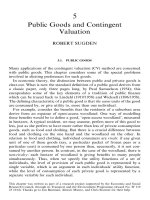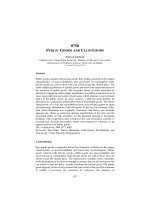public goods, redistribution and rent seeking
Bạn đang xem bản rút gọn của tài liệu. Xem và tải ngay bản đầy đủ của tài liệu tại đây (1000.63 KB, 164 trang )
TeAm
YYePG
Digitally signed by TeAm YYePG
DN: cn=TeAm YYePG, c=US, o=TeAm
YYePG, ou=TeAm YYePG,
email=
Reason: I attest to the accuracy and
integrity of this document
Date: 2005.05.27 15:27:35 +08'00'
Public Goods, Redistribution and Rent Seeking
The Locke Institute
General Director Financial Director
Charles K. Rowley, Ph.D. Robert S. Elgin, M.A.
Director of Legal Studies Program Director
Amanda J. Owens, Esq., J.D. James T. Bennett, Ph.D.
Editorial Director Conference Director
Arthur Seldon, C.B.E. Marjorie I. Rowley
Founded in 1989, The Locke Institute is an independent, non-partisan, edu-
cational and research organization. The Institute is named for John Locke
(1632–1704), philosopher and political theorist, who based his theory of
society on natural law which required that the ultimate source of political
sovereignty was with the individual. Individuals are possessed of inalienable
rights variously defined by Locke as ‘life, health, liberty and possession’, or,
more directly, ‘life, liberty and property’. It is the function of the state to
uphold these rights since individuals would not enter into a political society
unless they believed that it would protect their lives, liberties and properties.
The Locke Institute seeks to engender a greater understanding of the
concept of natural rights, its implications for constitutional democracry and
for economic organization in modern society. The Institute encourages high-
quality research utilizing in particular, modern theories of property rights,
public choice, law and economics, and the new institutional economics as a
basis for a more profound understanding of important and controversial
issues in political economy. To this end, it commissions books, monographs
and shorter studies involving substantive scholarship written for a wide audi-
ence, organizes major conferences on fundamental topics in political
economy, and supports independent research. The Institute maintains a pub-
lishing relationship with Edward Elgar Publishing. It also publishes its own
monograph series.
In order to maintain independence, The Locke Institute accepts no gov-
ernment funding. Funding for the Institute is solicited from private founda-
tions, corporations and individuals. In addition, the Institute raises funds
from the sale of publications and from conference fees. The Institute is incor-
porated in the State of Virginia, USA, and enjoys non-profit, tax-exempt
status under Section 501(c)3 of the United States Internal Revenue Code.
Officers of the Institute are listed above. Please direct all enquiries to the
address given below.
5188 Dungannon Road, Fairfax, Virginia 22030, US
Tel. (703) 934-6934 Fax (703) 934-6927
email:
Public Goods,
Redistribution and
Rent Seeking
Gordon Tullock
George Mason University, USA
The Locke Institute
Edward Elgar
Cheltenham, UK • Northampton, MA, USA
© Gordon Tullock, 2005
All rights reserved. No part of this publication may be reproduced, stored
in a retrieval system or transmitted in any form or by any means, electronic,
mechanical or photocopying, recording, or otherwise without the prior
permission of the publisher.
Published by
Edward Elgar Publishing Limited
Glensanda House
Montpellier Parade
Cheltenham
Glos GL50 1UA
UK
Edward Elgar Publishing, Inc.
136 West Street
Suite 202
Northampton
Massachusetts 01060
USA
A catalogue record for this book
is available from the British Library
ISBN 1 84376 637 X (cased)
Printed and bound in Great Britain by MPG Books Ltd, Bodmin, Cornwall
Contents
Preface vii
1. Some difficulties in the existing theory of 1
externalities
2. Coase and all that 18
3. More on why government? 28
4. The poor 39
5. The legacy of Bismarck 49
6. Some biological problems 56
7. The rich 66
8. A survey of the existing system 75
9. Rent seeking 92
10. War 101
11. Monarchies and dictatorships 114
12. What, if anything, should we do? 132
References 146
Index 149
v
I started on this book just as the difficulties with Iraq were
beginning to heat up. As a reader will remember, we took quite
a while getting ready to move. Thus a sort of war atmosphere
was present while I was writing the manuscript. I don’t,
however, think this had much impact on it. I have a few men-
tions of the war and of terrorism but they certainly don’t domi-
nate the book.
Basically it is a revision and improvement of the public
choice literature on why we have a state, and why it would be
nice if it worked better. It’s easy enough to read so that it could
be used for students who have had no introduction to public
choice, but I have enough new ideas in it so that it should be of
interest to more advanced scholars too.
At the end I propose some fairly radical revisions to the US
Constitution intended both to make it fairer by giving citizens
of different states equal representation in a revised Senate and
making it harder to engage in the kind of rent seeking which
tends to make us poorer. The last is rather radical, but I am well
known to be radical, albeit in an unusual direction.
vii
theory of externalities
This book carries a title, which may puzzle many readers. Public
goods, redistribution, and rent seeking do not seem to be closely
enough related to fit together in one book. Further, public
goods is a rather misleading name. I normally talk about exter-
nalities, rather than public goods. Externalities are the reason
that we must have governments and in many cases they lead to
discussion of specific government activities, which generate
further externalities and hence require further governmental
activity. Nevertheless, they are usually not discussed together,
nor in general, are redistribution and rent seeking included
under the same general heading. I hope to convince the reader
that it is logical to talk about them in an integrated way. I shall,
however, start with externalities without mentioning that the
existence of poor people in the community was listed by Milton
Friedman as generating something rather like an externality.
That subject will be put off until we reach the redistribution part
of the book where its connection with externalities will eventu-
ally be made clear. Further, the connection of both with rent
seeking will be made clear. I therefore hope that the reader will
be a little patient while I go through what he will probably think
is a detour before reaching the main themes.
What then is an ‘externality’? As the word implies it is some-
thing, which occurs as a sort of byproduct of any action. If I
mow my lawn, the noise may annoy my neighbor. This is an
externality. Similarly if I hire somebody to mow my lawn, this
voluntary contract may also noisily annoy my neighbor. This is
also an externality. These are private externalities, but it is pos-
sible for government to do things, which annoy people who live
outside its jurisdiction. War is an obvious case, but there are
1
many much more minor things which governments can do
which annoy outsiders. I must deal with even more primitive
and fundamental causes of government. We must for this
purpose go back to the origin of government, and that was so
long ago that we don’t really know much about it. Our near rel-
atives, the chimpanzees, live in bands with only the thinnest
signs of a government. There are dominance orders in most
chimpanzee bands but these do not function as government,
merely ensuring that dominant members have special privileges
(De Waal 1989, 1992).
1
They frequently have tribal territories
about which they fight.
2
When we turn to the pre-humans we know almost nothing
about them except that they lived in bands and had centers to
which they returned from time to time. They seem to have accu-
mulated workable stones brought from short distances in those
centers, which is how we know. It seems likely that they also had
dominant members.
Very primitive tribes also give us clues as to the early history
of our species. They usually have certain members whom schol-
ars call ‘Chiefs’ or ‘Matriarchs’ and who can obtain special
privileges from the others as well as settling disputes among
them. It seems likely that people who have special talents in the
use of force get general control of these tribes. With develop-
ment, these tribes might grow in size and even establish perma-
nent locations. Many primitive tribes, however, have a
geographical area, which they dominate, but they move around
a lot. Some engage in slash and burn agriculture. With the
improvement of technology it seems likely that the tribes would
get bigger and that the central control, individual or group,
would begin to use its power to tax the remaining members and
try to keep out other tribes. Thus taxing, policing to prevent
competition at the local level, and military force to prevent
competition from other tribes, were probably very early ele-
ments of these communities.
The oldest cities of which we have knowledge – Katal Huyuk
and Jericho are both fortified, albeit rather primitively. It is
only with the development of agriculture that permanent set-
2 Public goods, redistribution and rent seeking
tlement became possible. Presumably they originally developed
as simple farming villages but cities like Jericho and Katal
Huyuk are also very old. There is no doubt that they engaged
in considerable trade – Katal Huyuk dealt in obsidian, a very
valuable material in the Stone Age. From the remains it would
appear that they had a strong religion, but in neither case do we
have direct evidence of a central government. Granted the
necessity of mobilizing labor to build the heavy walls of Jericho
and the peculiar design of Katal Huyuk which seems to be
based on defensive considerations, it is fairly certain that they
had a central government. We do not know whether it was a
simple chief or some kind of consulting group. It seems likely
however that they had a chief who was normally a simple
extreme example of the dominance found in primitive tribes.
When we move along to literate societies, which started in
Mesopotamia, we find that they are based on irrigation agricul-
ture. This requires centralized control and the ability to mobi-
lize large numbers of workers (Wittfogel 1957). In these
city-states there were elaborate religious structures that appear
also to be centers of government. It is clear from the structures
that the government was able to mobilize for its own use a fairly
large part of the total wealth of the community. In part this
would be a necessity to keep up the irrigation system and in
part a necessity to keep out foreign robbers. The earliest evi-
dence that we have about the actual government of these enti-
ties are two epic poems about an early king named Gilgamesh.
We only have bits and pieces and further what we have is a
translation into a later language. The original text is gone. The
hero is a king but there is at least some indication of a consul-
tative body of some sort.
When we go to later in the same area, we have much better
data and the kings are absolute. It seems likely that the central
government such as it was had a monopoly of force (which, we
now tend to think, is a distinguishing characteristic of govern-
ment) and used it for its own benefit. Looking at it from the
standpoint of the common citizens, however, the necessity of
keeping the irrigation canals functioning meant that the need to
Some difficulties in the existing theory 3
mobilize large numbers of workers was obvious. Further, in the
early days, there were other such cities in the vicinity. It seems
likely that defense against them would have appeared to be nec-
essary to the average citizen. The pomp and ceremony of the
religion and the monarch’s court probably gave workers at least
some entertainment. Modern dictators normally have numer-
ous expensive ceremonies and apparently think that from the
standpoint of the dictator they have cost–benefit pay-offs.
With the exception only of irrigation canals, which were
apparently not necessary in Jericho and Katal Huyuk, the
origin of government in other areas was probably similar.
Apparently, somebody with special talents in the organization
of violence decided to tax his neighbors (subjects) in order to
support him and his mechanism of violence. It seems likely that
originally this was to the benefit of the citizens who were pro-
tected against theft and invasion. Mancur Olson with his usual
ability for the winning phrase referred to the ‘stationary bandit’
(1982), rather than the ‘roving bandit’. The chief or king had
strong motives to increase the productivity of his area because
much of the product would end up in his hands. This was only
true if he intended to stay there while a migratory bandit would
simply grab and leave.
That this was the origin of the state seems likely although it
was so long ago that we cannot be sure. In the late nineteenth
century, anthropologists visiting Africa found a number of
things, which they called ‘empires’. They were usually quite
small; a couple of thousand square miles at most and rather
recently created. Their history was much what we have deduced
above. Once control over a given tribal area was established, the
prevention of competition could be a high priority. Partly this
competition would be purely local, individuals stealing their
neighbors’ property which otherwise could be taxed by the
king. Thus the creation of some kind of police force would
seem likely. Note that this would benefit most individual citi-
zens as well as a king. We could regard this as the elimination
of an externality for the citizens, but that was probably not the
main motive from the government standpoint.
4 Public goods, redistribution and rent seeking
Prevention of competition from other tribes would also be a
high priority for the ruler. Thus he would develop an army to
keep out others and probably to increase his own tax ability by
aggression. The defensive part of this use of the army would be
a benefit to the citizens and he might have permitted them to
loot areas that he conquered so they gained there too. Note that
both of these primitive aspects of government to at least some
extent benefited the citizens if they could be said to have
reduced external costs. It seems unlikely however that that was
the motive of, in Mancur Olson’s phrase, the ‘stationary bandit’.
If he were going to engage in wars of aggression against his
neighbors, roads would be useful. The oldest known roads are
the ridgeways of England and we have no history to tell us their
origin although their utility is obvious. The first major road
system was built by the Assyrians, those mighty and aggressive
warriors. They built the first large road system to permit their
army to get around.
3
When the Assyrians were destroyed, the
Persians maintained and expanded their road system. No
doubt citizens as well as armies used the roads, but that was a
byproduct from the standpoint of the government concerned.
An externality was eliminated but that was not the motive of
the government. The citizens may have regarded the need to
build roads as obvious.
Above the front door of many American post offices is a
quotation from Herodotus describing the imperial Persian
postal system. It does not seem likely that this very well organ-
ized postal service was the first, but it does seem likely that the
postal service was originally developed for the purpose of
maintaining control of the empire in the hands of its ruler.
Thus, some basic functions of government were developed,
not to eliminate externalities but to make government more
secure and wealthy. Other people could use the roads and pos-
sibly the postal couriers would carry private correspondence as
well, but it was not an effort to benefit the citizens but to benefit
the government.
The Persians of course were not the last. Those mighty war-
riors, the Romans, build roads all over their extensive empire. I
Some difficulties in the existing theory 5
have walked across a bridge built in the reign of Tiberius. By
his time, the roads were not needed for conquest but they were
needed to keep the empire together. Chin Shih Huang Ti
unified China by military conquest, but he also provided a
major road network. The conquering Incas built excellent
roads in most unfavorable terrain.
The military significance of roads has continued. Hitler built
the autobahn for military purposes and in the 1950s, the US
interstate highway system was originally rationalized by
President Eisenhower as part of the defense establishment. Of
course roads have many other purposes than moving armies
and the post office is used more by private citizens than by the
government. In fact it appears to be in process of being elimi-
nated by competition from private companies. Nevertheless,
the highways’ origin was not elimination of externalities but
improving the power of the government.
Above, I said that economists normally justify government
activity by the elimination, or at least control, of externalities.
There is no doubt that much government activity is inspired by
that motive. There is also no doubt that much government
activity long ago when it first started was not intended to
reduce externalities but strengthen the powers of the ‘station-
ary’ bandit. We gained from it because he did in fact reduce
externalities, including those externalities of an invasion and in
present-day times it seems likely that such externalities moti-
vate most government action. That was not true however long,
long ago when government started.
There is another possible reason for government that ben-
efits the average citizens in many states but inflicts externalities
on citizens of other states. The United States has a Department
of Defense, which ironically has never fought a defensive war.
We Americans gained a great deal from the continuous minor
wars of aggression waged against the Indians and from the
major war of aggression against Mexico. Sometimes the wars
of aggression were unsuccessful. The war of 1812 did not
succeed in conquering Canada. President James Madison,
although brilliant in designing constitutions, was an ineffective
6 Public goods, redistribution and rent seeking
war president and the military machine had been so weakened
by President Thomas Jefferson that it was unable to carry out
its initial objectives. In any event we have gained from numer-
ous successful wars, and if we claim that they reduced external-
ities we are stretching the word a good deal.
4
Let us now turn to the externalities, which are used by most
economists to justify government. If I engage in activity which
injures or benefits someone else without his agreement, that is
an externality, albeit the person who feels the externality may
be happy about it if it is positive. Let me take an example.
Suppose at three in the morning I go out on the balcony of my
apartment and begin to practice the trumpet. Since my apart-
ment is in a large building and there are a number of other large
apartment buildings within 100 yards, there would probably be
considerable objection. Indeed the building police (a private
police company) would probably appear and make me stop. I
have clearly created a negative externality for my fellow dwell-
ers in the apartment complex and the policeman, collectively
hired by all of the tenants, is abating that externality. Note that
the building being a condominium, and the police being pro-
vided by a private company, does not change this matter much.
If for some reason the private policeman could not get me to
stop, the police provided by the city of Arlington would no
doubt take a turn. Indeed I might end up being tried by the
regular court.
But suppose I get pleasure out of practicing the trumpet. Is
preventing me from doing so an externality generated by the
other tenants and injuring me? I am sure most of my readers
will think this is a silly question, but why? Comparative
numbers is not the explanation. A loud and rowdy party dis-
turbing only one person at three in the morning would also call
for police intervention. The apparent explanation here is
simply that by the customs of our society, loud noises at three
in the morning are a nuisance and to be abated. Ownership of
an apartment carries with it a legal right to the absence of
annoying noises at three o’clock in the morning. Other societies
have other rules. One of the intriguing features of London is
Some difficulties in the existing theory 7
the extremely late hours that parties continue. Starting a party
at midnight is not totally out of the question.
These are different customs and there is no particular ratio-
nale for any of them. The one that is contrary to custom is
thought to be a generator of externality while the same amount
of noise under other circumstances is not (Coase 1960). There
is no way of deciding whether it is an externality except the pre-
vailing customs or the legal situation.
In Basle on one night of the year almost the entire populace
goes out and walks in the streets beating on drums. Clearly this
is as likely to disturb people’s sleep, as is my trumpet. But under
the local rules, it is perfectly legal, indeed approved, so that
someone who did not do this, particularly if they had small
children, would get a certain amount of social disapproval.
I have a number of libertarian friends. They object to the use
of force and violence or the threat implied by a policeman and
look for voluntary ways to dealing with such problems.
Suppose that instead of hiring a policeman my neighbors had
got together and paid me to stop. I imagine the per capita
payment needed would not be much more than the cost of
maintaining the police, and might well be substantially less.
Further note that no one is injured. I gain because I prefer the
fee and my neighbors gain because the cost is, probably, less
than hiring a policeman. Nevertheless I am sure most of my
readers will think that this is a silly proposal.
Why? The answer is fairly simple and is called ‘free riding’ by
professional economists (Olson 1965). If my neighbors formed
a coalition to pay me not to play the trumpet, any individual
could get the same benefit if he did not join the coalition and
hence did not put in any money. This would reduce the total
payment only trivially and presumably leave enough money
from the others to stop my playing the trumpet. This is obvious
but we would all assume that it would be impossible to actually
form the coalition because many of my neighbors would choose
to free ride on the gifts of the others. This would increase the
payments needed by those who were making contributions and
hence magnify the motive for abstaining. Further, if my moral
8 Public goods, redistribution and rent seeking
principles were weak, I might play the trumpet solely in order
to procure payments designed to make me stop.
This is not the only case of this kind. Indeed the prospect of
this kind of free riding is normally used to explain the need of
government compulsion. Things like the payment to not play
the trumpet at three in the morning are rather misleadingly
called ‘public goods’. I did not invent this usage and would
prefer some other phrase, but this is what you will find in most
economics books.
Let me go through a few other cases. When I moved into my
house in Tucson, Arizona, I discovered that eta ants (some-
times called parasol ants) had a nest in my backyard. These
ants, probably the most developed of the ant family, take small
pieces of leaves off trees and other plants, carry them to their
nests (hence the name parasol ants) and chew them up and
raise mushrooms on them. These mushrooms are the sole food
of these ants. Since they can strip almost any plant, including
trees, of their leaves, they are a decided nuisance. In addition
they are very hard to kill off.Ifpoison is put on the ground near
the entrance of their nests, they stay inside eating the mush-
rooms and they create an alternative entrance.
At the time I moved in, it was a small nest and had not
damaged the plants of my neighbors, but this was obviously
merely a matter of time. Was this is externality? I am not an
environmentalist, but I am interested in social insects. I might
have kept them to study. Would this be an externality? And if
my neighbors had complained vigorously and audibly, would
their complaints be an externality? Suppose my neighbors were
environmentalists and objected to changing the balance of
nature. If I wanted to eliminate the ants in order to protect my
own garden, these neighbors presumably would object. To make
it more complicated there are environmentalists who are protec-
tive of plants not animals. They might think that killing these
ants was environmentally required. What is the externality?
I had other difficulties with social insects. It turned out that
another native species, termites, were living under the concrete
slab on which my house stood and beginning to eat the wooden
Some difficulties in the existing theory 9
parts of the house. Ignoring environmental concerns, I called
an exterminator who proceeded to take care of the problem by
poisoning them. He reported, however, that he could not find
the nests and thought it might be under the other part of the
concrete slab upon which my house was built. There were two
houses sharing a common wall and on the same slab. My neigh-
bors were reluctant to do anything about the termites. Was it
then an externality? And if so was I inflicting it on them, or
they inflicting it on me? Fortunately for me, the exterminator
company had a very persuasive salesman who succeeded in
selling them an extermination job.
The development, which had been built into a condominium
by a real estate company, was on the side of the hill with a very
pretty view across the city of Tucson to the mountains beyond.
There were some trees already in existence and the real estate
company planted more. With time they got bigger and began
interfering with the view of some of the houses. I was fortunate
in that they in essence improved my view because they were not
directly between my house and the city. It happened that the
real estate company had realized this might happen and put in
our charter a provision that trees, which interfered with the
view, could be cut down. This provision, of course, could be
changed by the ‘government’ of the condominium. It turned
out some people wanted some trees cut down and others were
firmly in favor of preserving them. In this case the squabble was
carried on within the elected government and at annual meet-
ings. Was the externality the trees, the view, or the disturbances
in governmental meetings that the problem raised?
Tucson, being on the edge of the tropics, there were certain
noxious insects about. Several times I exterminated small col-
onies of black widow spiders. Returning to the environmental-
ists, some of them might have objected to my reducing the
variety of species in the area by killing termites and eta ants. I
don’t think that environmentalists ever object to killing black
widow spiders in inhabited areas, particularly where there are
children. Nevertheless it is quite possible that, even there, I was
inflicting externalities on environmentalists who object to the
10 Public goods, redistribution and rent seeking
extermination of any species or even radical changes in the
‘state of nature’.
There are other more complicated cases. In my front yard I
had a night-blooming Cereus.For those who have not seen
them, this has white flowers five to six inches across which open
about 7:00 in the evening and close at dawn. The individual
bloom lasts only that one night, but the cactus upon which it
blooms will produce more such flowers for quite a while during
the summer. My neighbors used to admire my flowers and
would occasionally take pictures or invite their guests to come
and look. This can be called a positive externality since my
activity in leaving the cactus in place benefited my neighbors.
Unfortunately, this particular flowering cactus is fertilized by
bats. I remember my surprise at looking into the flower and
seeing a bat drinking the nectar. But there are some people who
dislike bats, especially when they are rabid. My cactus attracted
bats. Was it then generating a negative externality that more
than counterbalanced the positive externality produced by its
appearance? It could be producing positive externalities for
some people and negative for others.
Of course we could subsidize people who produce beauti-
ful gardens for the benefitoftheir neighbors and passersby.
Some neighborhoods have little contests with a prize for the
most attractive yard. The particular condominium that I lived
in Tucson did not have such prizes, but they did have rather
strict rules on what you could have in your front yard. It had
to be native desert plants and you could not raise grass. The
back yard, which was generally invisible because of a wall,
wasfreefor anything you wished to raise. Except for the grass,
which was banned by the county government in order to con-
serve water, these rules were strictly local. The idea was to
improve the general appearance of the neighborhood and to
keep up the resale price of the houses. There were also restric-
tions on the house design for the same reason. The result was
avery generally pleasant appearance and good resale values
on houses.
I used to live in Blacksburg, Virginia, where the dogwoods
Some difficulties in the existing theory 11
were particularly beautiful in the spring. I used to drive out of
my wayinorder to pass by a house with a spectacular display of
dogwoods in the spring. The owner of the house was generating
a positive externality, or perhaps a negative externality, on their
neighbors who had to put up with considerable excess traffic.
Returning to Tucson and the rules of my condominium, in a
part these rules involved the color of the house and all houses
were made of the same type of brick. One new arrival pur-
chased an empty lot and began building a house using a differ-
ent color brick. The condominium association warned him
about this, eventually sued him and collected $7000. Was he
generating an externality or was the condominium association
generating an externality by first criticizing seriously and then
suing? How about the regulation on the color of my house?
Suppose that I would prefer another color. Are they imposing
a negative externality on me?
At the time that I was writing this chapter the United States
was full of prominently displayed American flags as a result of
the terrorist attacks on the World Trade Center. A Mrs. Parrot
erected a ten-foot flagpole in her front yard, landscaped its base
and raised an American flag. She was a citizen of a condomin-
ium, which had a rule against flagpoles in the yard although not
those attached to the house. Rather to my astonishment, and
that of most other people, I suspect, the condominium associ-
ation began legal proceedings against her. Her immediate
neighbors did not object to the flag and in the current patriotic
mood it seems unlikely that anybody much really objected.
Nevertheless the condominium association governors objected
and sued.
5
I suspect that most of my readers, have, in each case, made
their decision as to whether these are externalities fairly easily.
A little experimentation, however, has shown that different
people make different decisions. Further, when people engage
in careful thought about one of these problems, they tend to
change their mind and then after further thought change back,
etc. Since these problems are not very important, it is not
worthwhile spending a lot of time worrying about them.
12 Public goods, redistribution and rent seeking
Nevertheless the fact that people do reach different decisions
and change their minds indicates there is no straightforward
rule for controlling them.
In general, these problems either are dealt with informally by
discussion, sometimes very acerbic discussion, or referred to
some governmental agents. Sometimes, they will be referred to
an arbitrator who is usually simply some prominent person in
the area. It is not true however that this always resolves the
problem. The parties may be dissatisfied and perhaps regard
the decision by the government or an arbitrator as inflicting
negative externality upon them.
Government is not a final solution, because governments
sometimes inflict externalities. These may be inflicted on a
minority within the government’s area or outside. The reader
may think that the word ‘externality’ should not be used if it is
a government agency and the victim is a member of the com-
munity. This is simply a question of word usage. Bombing of
cities in a foreign country would be clearly an externality, but
it is not custom to deal with war in these terms. Thus our
imposing a no-flight rule on about two-thirds of Iraq may be
objected to or approved of without considering whether it was
or was not an externality. I suppose that the bombing of the
Wor ld Trade Center was strictly speaking, an externality
imposed by one lunatic religious group. I do not think however
that that is the way the problem is looked at by most people and
from now on I will follow common usage in this case.
Let me look at simple examples of governmental units
inflicting externalities on people outside that unit. Once again,
I turn to the condominium development in which I lived in
Tucson. Some years before this condominium was constructed
a small development had been built in which a minor road with
a couple of offshoots had been constructed connecting to a
major street. The idea was to provide space for house building,
and people in fact bought lots and built houses. They had a tiny
collective organization for the 25 or so houses.
When the real estate firm,which built the condominium in
which I lived, started it, its street system was connected to two
Some difficulties in the existing theory 13
major streets. In one case, the less important, the connection
was by way of the street built by the previous developer for the
small colony of houses built on his lots. As it turned out this
entrance was used a good deal with the result that there was
fairly heavy traffic through the small development. Since a
number of these houses had children who might be run over
and all of them objected to the noise and other disturbances
caused by this traffic, they decided to cut the use of ‘their’ road
by blocking the end of it. The condominium dwellers objected
and took the matter up with the county government. Since they
outnumbered the voters living on the short road by twenty to
one, the county government sided with them. Clearly the large
number of voters in this case chose to inflict an externality on
the few.
As a general proposition, in democratic states the majority
may, and frequently does, inflict costs on minorities. The high
taxes on the wealthy are an obvious example. Is this an exter-
nality? If the wealthy live in the same community with the poor,
some would probably say that it is not. On the other hand, the
Southern Blacks before 1864 lived in the same communities
with the whites and some would say that the laws imposing
slavery were generating externalities. Once again in this case I
shall simply leave the matter aside for a few paragraphs on the
grounds that common speech does not use ‘externalities’in that
way. Since I have in various cases above rather stretched the
meaning of ‘externality’ the reader may object to my not
stretching it here. If so, with very little difficulty he or she can
use the words as they wish.
There is however a serious difficulty with this definition. It is
frequently argued that externalities are a major justification for
government. The government can in many cases deal with
externalities by imposing a rule. There are two problems here.
In the first place a government rule may be the one which
imposes externalities, as in the road case above. In many cases
the government rule simply provides that one of the two sides
who have a disagreement about something, say the termites,
must follow a particular rule. Assuming the government is
14 Public goods, redistribution and rent seeking
capable of enforcing its decrees, this eliminates the possibility
of fighting or quarreling about it, but it does so by inconve-
niencing one of the parties in order to benefit the other.
Obviously, we must on occasion accept this outcome, but it
does not really cure the externality. It merely says that one party
may inflict the externality on the other. This may be a reason-
ably satisfactory outcome, but it is an outcome that does not
eliminate the problem.
In fact, there may be externalities within the government.
Returning once again to the condominium in Tucson, in addi-
tion to private gardens, there were some common areas, which
were gardened by a contract gardener. One very aggressive
member of the little society became convinced that the gar-
dener was doing a bad job. He then began a vigorous one-man
campaign to get further work done. He annoyed the president
of the society and the members of the various boards by tele-
phone calls and personal visits and circulated manifestoes on
the subject. Eventually, the president of the society resigned in
order to spare herself from his visits and phone calls. At the
time when I left the area, his campaign was still going on and
it would be possible to argue that there had been some improve-
ment in the gardening in the common areas.
My impression is that although this was an extreme example,
internal disputes within government agencies produce some-
thing that is very similar to an externality even if that word is
not normally used. Normally, of course, disputes within very
small government agencies like our condominiums are settled
relatively peacefully. They frequently leave a residue of ill
feeling on one side or the other. With larger groups the ill
feeling may be extreme and long lasting. For many people the
Civil War is not yet over.
In many cases, of course, once a government has made a
decision on such a matter, people entering the area later will
have to take it into account and this may in fact reduce the
externalities. Returning to my condominium development in
Tucson, the decision as to the color of the houses means that
anyone building a new house who prefers some other color
Some difficulties in the existing theory 15









